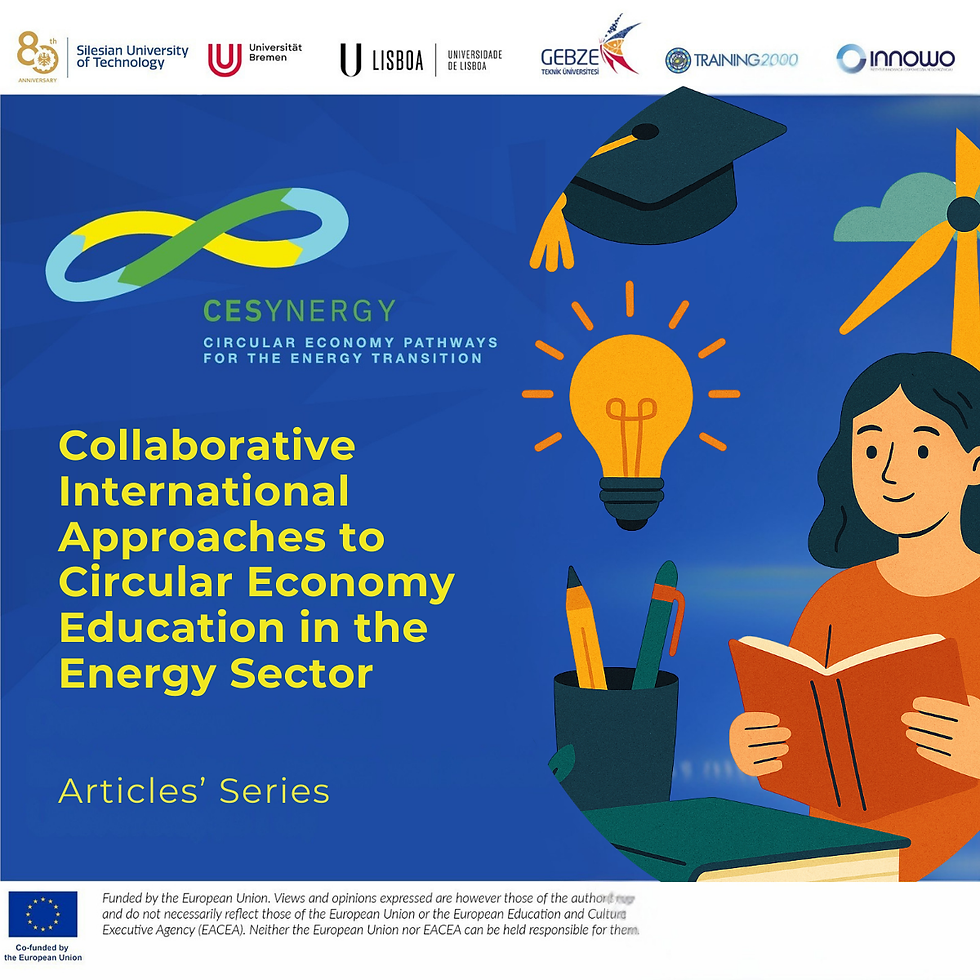Collaborative International Approaches to Circular Economy Education in the Energy Sector
- medycynapersonaliz
- 12 maj 2025
- 2 minut(y) czytania

Introduction
The energy sector is at the forefront of the global transition towards sustainability, with the circular economy (CE) emerging as a crucial framework for resource efficiency, waste reduction, and climate action. As the sector evolves, there is a growing recognition that education-especially through international collaboration-is essential to equip future professionals with the skills and systems thinking needed to implement CE principles effectively in energy systems.
The Imperative for Circular Economy Education
The shift from linear to circular models in energy production and consumption requires a new generation of professionals who can design, manage, and innovate within complex, interconnected systems. However, research indicates that higher education programs often lack comprehensive resources and methodologies to fully prepare students for these challenges, particularly in real-world settings[1][2]. The integration of CE principles-such as life cycle thinking, systemic analysis, and sustainable business model innovation-into energy curricula is thus a pressing need[3][2].
International Collaboration: Expanding Impact and Innovation
International collaboration in CE education offers several key benefits:
Diverse Expertise: Cross-border partnerships bring together varied academic traditions, industry insights, and policy perspectives, enriching the educational experience and fostering innovation[4][5].
Resource Sharing: Collaborative networks enable the development and dissemination of high-quality, multidisciplinary teaching materials and methodologies, which can be adapted to different regional contexts[6][5].
Global Relevance: Joint initiatives ensure that educational programs address the universal and interconnected nature of sustainability challenges in the energy sector, preparing students for roles in international teams and organizations[4][5].
Innovative Pedagogical Approaches
Recent research and educational experiments highlight several effective methods for embedding CE in energy education:
Project-Centered and Challenge-Based Learning: Hands-on, real-world projects help students grasp the complexity and systemic nature of CE transitions[1].
Simulation and Serious Games: These tools foster critical thinking and systems understanding, allowing students to experiment with circular strategies in risk-free environments[2].
Industry Collaboration: Partnerships with energy companies provide students with practical experience and exposure to current challenges in implementing CE principles[2][5].
For example, the CIRCULAR pathway methodology developed at Maastricht University guides students through exploratory redesign of real-world value chains, enhancing their understanding of complexity, linearity, and the need for systemic change[1].
The Role of Higher Education Institutions
Universities are uniquely positioned to drive the shift towards a circular energy economy by:
Embedding CE and sustainability concepts across engineering, business, and policy curricula[2].
Facilitating interdisciplinary learning and research that mirrors the interconnected challenges of the energy transition[6][5].
Acting as hubs for international cooperation, knowledge exchange, and innovation in CE education[4][5].
Conclusion
Collaborative international approaches are essential for advancing circular economy education in the energy sector. By leveraging diverse expertise, innovative pedagogies, and cross-border partnerships, educational institutions can prepare graduates to lead the transition towards sustainable, circular energy systems worldwide.
References
"The CIRCULAR pathway: a new educational methodology for exploratory circular value chain redesign," Frontiers in Sustainability
De la Torre, R., et al. "The Role of Simulation and Serious Games in Teaching Concepts on Circular Economy and Sustainable Energy," Energies, 2021
"Enhancing Circular Economy education and training for the energy sector," ScienceDirect.
"Circular economy in the renewable energy sector," ScienceDirect
Caetano, N.S., et al. "ICEER2019Aveiro: Energy and environment - challenges towards circular economy," Energy Reports, 2020
"The Importance of Higher Education in the EU Countries in Achieving the Objectives of the Circular Economy in the Energy Sector," SGGW



Komentarze